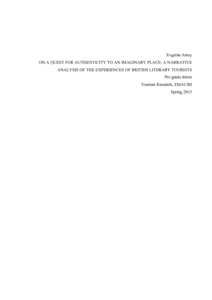On a quest for authenticity to an imaginary place : a narrative analysis of the experiences of British literary tourists
Amey, Evgenia (2015)
Amey, Evgenia
Lapin yliopisto
2015
openAccess
Tiivistelmä
Literary tourism is a sub-sector of cultural tourism and relates to travelling to places connected to fictional texts and the authors of those texts. Although it is an old form of tourism and lies at the foundation of classic European Grand Tour, it has not received much academic attention until recently and a number of qualitative studies on literary tourist experiences is still limited.
The general aim of this study is to address the lack of knowledge on literary tourist experiences by analysing the role of authenticity in literary tourist experience through the analysis of literary tourists‟ accounts of their literary trips. The scientific objective is to explore the connection between the imagination and authenticity at literary tourism sites. An ongoing discourse on authenticity in tourism saw the emergence of different views and resulted in proposition of three types of authenticity, namely objective, constructive and existential authenticity; the first two types are viewed as object-related, while existential authenticity is subject (or tourist)-related and is based on personal experience.
The research tasks are, firstly, to explore how respondents prescribe meanings to their literary tourist experiences; secondly, to discover how authenticity appears in narratives of literary tourist experiences; and, thirdly, to find out how respondents construct their narratives of literary tourist experiences. Collected data includes seven narratives, written by respondents on their literary tourist experiences; it also includes a travel journal, jointly produced by members of after-school study group from Ironville about their literary trips, and group supervisor‟s notes on the effects of literary tourism on students. Apart from content analysis, structural analysis of narrative was conducted using Greimas‟s actantial model.
The research results support the assumption that both object-related (objective and constructive) and subject-related (existential) authenticity are important in literary tourist experience, and that object-related authenticity can facilitate subject-related authenticity. The study confirms that authenticity is perceived and consumed differently by individual literary tourists based on their motivations, expectations and dedication to writers and literary works. Analysis of narratives using Greimas‟s actantial model demonstrates that respondents‟ narratives follow similar structure and are centred on literary tourists‟ quest for authenticity.
The results of the study can be utilized in management of literary destinations. Future research on literary tourist experiences could concentrate for instance on the specifics of tourists‟ age and gender, literary touristic „communitas‟ and literary tourism as family activity.
The general aim of this study is to address the lack of knowledge on literary tourist experiences by analysing the role of authenticity in literary tourist experience through the analysis of literary tourists‟ accounts of their literary trips. The scientific objective is to explore the connection between the imagination and authenticity at literary tourism sites. An ongoing discourse on authenticity in tourism saw the emergence of different views and resulted in proposition of three types of authenticity, namely objective, constructive and existential authenticity; the first two types are viewed as object-related, while existential authenticity is subject (or tourist)-related and is based on personal experience.
The research tasks are, firstly, to explore how respondents prescribe meanings to their literary tourist experiences; secondly, to discover how authenticity appears in narratives of literary tourist experiences; and, thirdly, to find out how respondents construct their narratives of literary tourist experiences. Collected data includes seven narratives, written by respondents on their literary tourist experiences; it also includes a travel journal, jointly produced by members of after-school study group from Ironville about their literary trips, and group supervisor‟s notes on the effects of literary tourism on students. Apart from content analysis, structural analysis of narrative was conducted using Greimas‟s actantial model.
The research results support the assumption that both object-related (objective and constructive) and subject-related (existential) authenticity are important in literary tourist experience, and that object-related authenticity can facilitate subject-related authenticity. The study confirms that authenticity is perceived and consumed differently by individual literary tourists based on their motivations, expectations and dedication to writers and literary works. Analysis of narratives using Greimas‟s actantial model demonstrates that respondents‟ narratives follow similar structure and are centred on literary tourists‟ quest for authenticity.
The results of the study can be utilized in management of literary destinations. Future research on literary tourist experiences could concentrate for instance on the specifics of tourists‟ age and gender, literary touristic „communitas‟ and literary tourism as family activity.
Kokoelmat
- Pro gradu -tutkielmat [4965]
